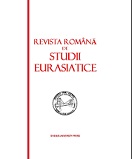GÂNDIREA ESHATOLOGICĂ BIZANTINĂ ŞI CONSECINŢELE SALE POLITICE
ESHATOLOGYCAL BYZANTINE THINKING AND POLITICAL CONSEQUENCES
Author(s): Adriana CîteiaSubject(s): History
Published by: Ovidius University Press
Keywords: politics; theology; eshatology; literature.
Summary/Abstract: Being in a certain space and depending by a specific custom supposed in a byzantine political religious context, a very long process of defining the cultural matrix, and a big effort of cultural and political anamnesis. The exterior space of Byzantium mobile border was clearly defined both from the immediate policy perspective of the Empire, as symbolic. Regarding Byzantium perathologic case, the external world mean a number of ethnic drawn in Byzantium influence sphere by missionary means or pure political act – bulgarian example being eloquent. The border (peras) wasn’t a simple form of expressing property feeling, as sending to the exterior space, the place where the adventure of self-religious and political self unfolded in relation with the world. Political eshatology may define cultural and political proximity of Byzantium Empire and Ottoman Empire that succeeded.
Journal: Revista Română de Studii Eurasiatice
- Issue Year: 6/2010
- Issue No: 1+2
- Page Range: 7-12
- Page Count: 6
- Language: Romanian

